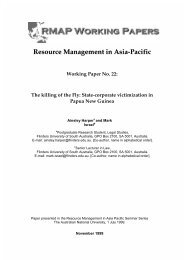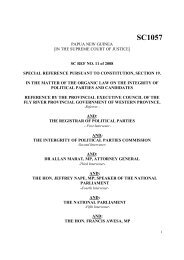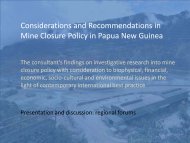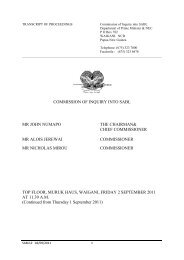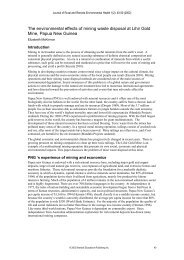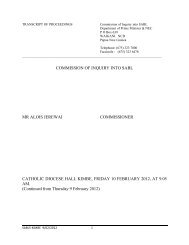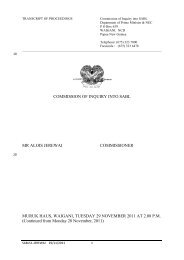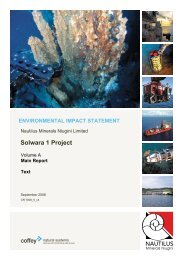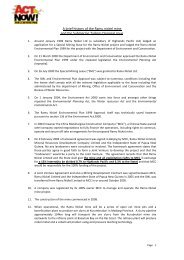Fishy business. The Social Impact of SST.pdf - Act Now!
Fishy business. The Social Impact of SST.pdf - Act Now!
Fishy business. The Social Impact of SST.pdf - Act Now!
Create successful ePaper yourself
Turn your PDF publications into a flip-book with our unique Google optimized e-Paper software.
problems <strong>of</strong> the poor.’ He pledges that ‘firm steps’ would be taken to preclude a ‘classsociety…emerging in this country.’Sadly, no such steps were taken. Gewertz and Errington found that (Ibid:144) :[H]owever optimistic and energetic many <strong>of</strong> the Papua New Guinean middle class might beand however important an effect they might have in driving contemporary changes in PapuaNew Guinean society, the future they confronted was an uncertain one <strong>of</strong> twists and turns:theirs was a world strongly affected by the shifting strategies and interests <strong>of</strong> anincreasingly influential corporate and multinational capitalism.It is an obsolete paradigm to think <strong>of</strong> development as a trade<strong>of</strong>f between culture and progress.Postwar development theory shifted in the eighties away from a top-down North-Southdistribution <strong>of</strong> ‘aid’ toward a more equable understandings <strong>of</strong> change in the developing world.Ideas about modernity began to change: the new China, for example, does not aspire to look likethe new London, new Tokyo or new Detroit. Development is always a Faustian contract. Somecall it planned poverty (Illich 1997:99). But the more important it becomes, the more dangerousit also threatens to become. In Arturo Escobar’s critical description <strong>of</strong> the postwar picture(Escobar 1997:91-2),[D]evelopment grew to be so important for Third World countries that it became acceptablefor their rulers to subject their populations to an infinite variety <strong>of</strong> interventions, to moreencompassing forms <strong>of</strong> power and systems <strong>of</strong> control; so important that First and ThirdWorld elites accepted the price <strong>of</strong> massive impoverishment, <strong>of</strong> selling Third Worldresources to the most convenient bidder, <strong>of</strong> degrading their physical and human ecologies,<strong>of</strong> killing and torturing, <strong>of</strong> condemning their indigenous populations to near extinction; soimportant that many in the Third World began to think <strong>of</strong> themselves as inferior,underdeveloped and ignorant and to doubt the value <strong>of</strong> their own culture, deciding insteadto pledge allegiance to the banners <strong>of</strong> reason and progress; so important, finally, that theachievement <strong>of</strong> development clouded awareness <strong>of</strong> the impossibility <strong>of</strong> fulfilling thepromises that development seemed to be making.<strong>The</strong> alternative is finding another economic model for the developing world, which is wherepost-development research and theory stands today. 2 But in the East Sepik Province, the onlydefense against unplanned and inappropriate development appears to be the aptly named ‘4 thDimension’ in the Province’s Corporate Plan. As explained in the plan itself:<strong>The</strong> PNG Government system, including that <strong>of</strong> the East Sepik Province is chiefly based ona three dimensional dynamics. This system has for many years overlooked andovershadowed the empowerment need <strong>of</strong> the people. While the Nation recognizes theunique diversity and successfully forges unity, it fails to realizer the dynamics <strong>of</strong> the<strong>business</strong> sector in the industrial and commercial world which is foreign to most PNGpeople.It’s hard to see how this kind <strong>of</strong> thinking will in any way preclude the imbalances <strong>of</strong> foreignventures, much less guarantee the full empowerment <strong>of</strong> the grassroots. But this is be discussedfurther below.2 Illich tells us (Op cit:99): “<strong>The</strong> only feasible answer to ever-increasing underdevelopment is a response tobasic needs that is planned as a long-range goal for areas which will always have a different capitalstructure. “24



